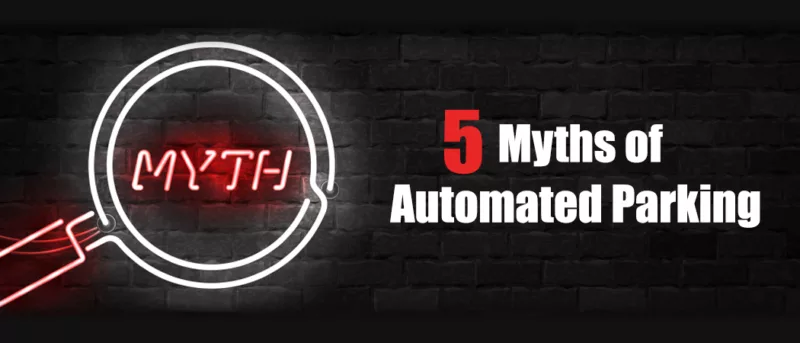
People are almost always hesitant when it comes to embracing new technologies. However, with the rise of smart cities that prioritize interconnectivity and the utilization of IoT, technology has proven to ease inconveniences of everyday life, no matter how small or insignificant the innovation may seem. Many misconceptions about these technologies include automated parking, where major business decision makers are sometimes hesitant to invest.
Here, we will break 5 myths about automated parking systems (APS) and give decision makers a clearer view of the landscape:

MYTH 1: It's too expensive
While it may seem as though implementing an APS is expensive with upfront costs, it can actually save business owners money both immediately and long-term depending on circumstances. Thanks to lower floor-to-floor ceiling height requirements alone, costs can be saved on excavation, space, and the avoidance of water table issues.
For example, Westfalia is implementing an APS in Philadelphia that originally had a 33-unit student housing building planned with 11 conventional parking spaces (as the developer could build three units for every parking space provided). After implementing automated parking, the building grew to over 100 units as the APS provided 31 parking spaces in the same single basement level, essentially tripling the number of units the business owner could build simply through the utilization of a system that was preconceived as “too expensive.” Stories like this are not only applicable with residential space, but with commercial and mixed-use facilities as well. Less space needed for parking directly translates into more space for other real estate uses, or cost savings due to reduced excavation, reduced construction time and lower land costs.
Another factor to consider is parking minimums. Some city and municipal governments have codes that dictate a specific number of parking spaces per building. When expanding conventional parking isn't an option, a cost-saving APS can effectively double-parking capacity through intelligent, densely organized storage. Not to mention that APSs do not require finishing of any kind, cutting additional material and labor costs.
A quick question to ask yourself is: "Can automated parking increase the value of my real estate?"
With a holistic view, the answer can likely be "yes" with very few exceptions. Sometimes, property owners have high-value real estate, like high-end metropolitan condos, and choose to implement an APS even if it isn't needed for considerations like land-use and cost savings, but because it offers users a luxurious parking experience.

MYTH 2: It's unreliable and inconsistent
Simply put, our customers wouldn't keep returning for more APSs if they didn't meet expectations. Reliability and consistency is key, which is why our systems boast an average availability of 99.7%. From public APSs in Copenhagen to high-rise luxury condos in Philadelphia, our systems have proven to be dependable and convenient for business owners, residents, and patrons. With recent and upcoming projects in major urban areas like Philadelphia, Salt Lake City, San Diego, and Alexandria, we are not only a proven expert in automated parking, we are also a widely trusted one.
Nationally recognized architecture and engineering firms not only recommend Westfalia to one another based on our APSs, but it's also how we work with people. With a dedicated aftermarket team that delivers optimal maintenance, APS investors can be at ease knowing that we work with our customers throughout the entire life cycle of a project.

MYTH 3: It's new and untested technology
Automated parking may be new to you, but it's not to us. While we are always working on advancing our APS technologies (like offering both pallet and palletless systems), we have over five decades of global automation experience. In fact, our APS designs are based on the blueprint of our automated storage retrieval systems (AS/RS), a longstanding and proven automated technology that is transforming the modern warehouse. With a focus on space optimization, reliability, and flexibility it's no wonder why our automated parking evolved from the time proven technology of our AS/RS.

MYTH 4: It's not safe
Something that we always like to point out is that parking is directly tied to the health and wellbeing of surrounding communities. Not only are APSs safe, but they actually contribute to a decline in overall crime from violent assaults to vandalism. Considering that conventional parking garages are one of the most likely settings for violent crime in general, APSs completely eliminate these crimes.
Users are also able to perfectly time their vehicle retrievals via an app with a live, real-time countdown display of when their vehicle will be ready. Instead of navigating a poorly lit parking garage, drivers can personally enter the brightly lit transfer area to retrieve their vehicles. Eliminating public access to parking facilities is essential to decreasing parking crime. Not to mention that thousands of accidents happen in conventional parking garages every year, equivalent to roughly 20% of overall annual accidents. Parking can’t get any safer than with an APS.

MYTH 5: You can't charge EVs
With the world rapidly unraveling its reliance on fossil fuels for more sustainable forms of energy, electric vehicle (EV) charging compatibility is a must-have for the future built environment. Our APSs and WEPLUG® EV charging technology address these compatibility needs.
The only user difference between EV and gasoline fueled drivers when parking in one of our APSs is that once an EV driver parks in the transfer area, they simply plug an adapter into their charging port. EV drivers can utilize a kiosk screen just outside the transfer area to select if they want their vehicle charged, the intended charge percentage, and a time of when the driver plans on retrieving their vehicle. Additionally, Westfalia's smartphone app allows EV drivers to see how long it will take for their vehicles to charge and will even send notifications to let drivers know when their vehicle began charging and when it's complete.
In addition to EV charging capabilities, our APSs boast environmental sustainability with a 80% reduction in emissions, the reduction of both noise and air pollution, and the enhancement of urban green space and land use, all with an aesthetically pleasing design.
Given that roughly 2.5 billion people will be living in cities by 2050, the world will have to find a better way to park, and automated parking is a great solution for urban environments.
Discuss automated parking for your next project with an APS Expert